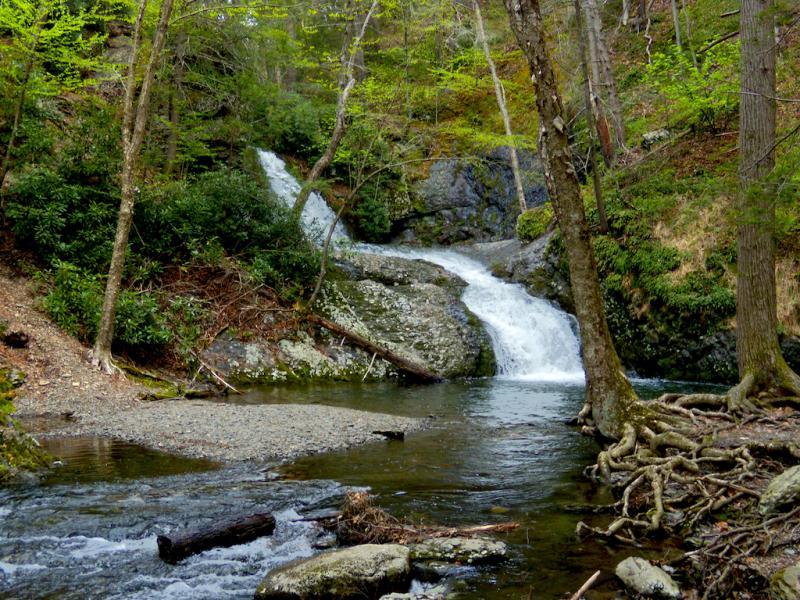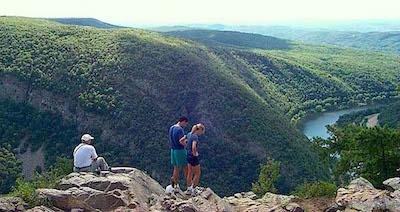
Should the Delaware Water Gap National Recreation Area be redesignated as a national park?/NPS file
Are the benefits of "national park" status negated by what some see as unwelcome aspects of such a designation? That's the question revolving around efforts to see Delaware Water Gap National Recreation Area renamed as a national park.
So concerned are some by the possible name change that they formed a nonprofit Delaware Water Gap Defense Fund to "preserve, protect, and promote responsible resource management and diversity of recreational opportunities within the DWGNRA. We are currently working to prevent the efforts of any group or organization to change the designation of the Delaware Water Gap National Recreation Area to that of a National Park and Preserve."
The Water Gap, as it's known, straddles the New Jersey-Pennsylvania border and has existed since September 1965. It is a nearly 70,000-acre unit of the National Park System, with park lands almost equally divided between the two states along and including the 40-mile-long Middle Delaware National Scenic and Recreational River, which is the boundary between the two states.
Proponents of the name change say it would raise the prominence of the site, bolster environmental protections, better preserve archaeological sites and local history, and provide an economic boost for surrounding communities. Opponents, though, fear a "national park" would close areas now open to hunting.
That spurred a campaign to have the Water Gap renamed as a "national park and preserve," which would allow thousands of acres to remain open to hunting.

But the Delaware Riverkeepers Network is concerned about negative impacts that would flow from greater recognition, and visitation, tied to the name change.
"It is our considered opinion that the water quality and ecosystem impacts of the development planned should national park status be achieved, compounded by development outside of the park boundaries that will additionally ensue, will compromise the high quality water and natural ecosystems of the River, to a degree not in keeping with the needs and goals of our region or the Special Protection Waters designation that we have worked so hard to secure and uphold for the non-tidal River," the group said in a letter [attached below] to those driving the name change.
"National Park status will significantly increase the number of visitors to the park in the near term and the long term – thereby increasing the environmental footprint and creating increasing rationale for additional infrastructure including parking lots, sewage treatment and other utility facilities, hotel housing, and other development," the letter continued. "The footprint and activities plan, by sheer virtue of their size and scope, will inflict irremediable harm and undermine any efforts of NPS to prioritize river protection over visitor experience."

 Support Essential Coverage of Essential Places
Support Essential Coverage of Essential Places




Comments
I live in the area and am personally pro-national park because of the potential funding (despite the large backlog). The Gap really does need additiona monetary support to keep up with maintenance. I absolutely love it there too.
It's also hard to imagine there would be much more visitiation. It is already a truly huge draw in the summer, pulling in people from the NYC metro. It is a known quantity and adding Nat Park status will not suddenly make it draw like Yosemite.
It used to be that the title "National Park" Was reserved for the Crown Jewels in the National Park system. Using economic reason to rename lesser park area seem disingenuou.
Those opposed to the redesignation of the Delaware Water Gap National Recreation Area to a national park and preserve often quote the Delaware Riverkeepers Network. The Delaware River National Park and Lenape Preserve Alliance, which is advocating for the proposal, strongly disagrees with the opinion of the RiverKeepers. There are significant environmental benefits that will result from the redesignation.
Please go to the website ourparks.org and click on "Response to the Delaware Riverkeepers Network" on the Resouces page to learn more.
The name attracts the visitors! This illustrates the fact that people visit the parks for the wrong reasons. People don't seem to think much about the real reasons to visit. National Park status = more visitors = more money = destruction of visitor experience.
Bob- Everyone has their own reasons and the right to have their own reason no matter what you think their reason should be. When I hiked the AT, a lot of people complained about the way others approached the hike - too much gear, skipping sections, resting too often ..... We had a saying for them "Hike your own hike".